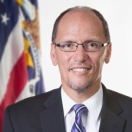
Ed. note: This is cross-posted on the U.S. Department of Labor's blog. See the original post here.
Last night, New York Mets second baseman Daniel Murphy participated in Major League Baseball’s All-Star Game – proof positive that you can perform peerlessly at your job while still taking care of your family at critical moments. Murphy made headlines a few months ago when he chose to miss the first game of the season to be with his wife after she gave birth to their child.
Murphy’s story is one about having the right priorities and being faithful to your values, even in the face of criticism. But his story is about something else very important – the power of membership in a strong labor union, which can use collective bargaining to secure paternity leave and other essential benefits.
Three weeks ago, a crowd of more than a thousand – workers, business leaders, policymakers, advocates, and more – gathered at the first White House Summit on Working Families to ignite a conversation about how to provide more people with the same workplace benefits and protections enjoyed by Daniel Murphy. And the labor movement, which has been in the vanguard of this struggle, played a prominent role.
We heard at the summit from prominent labor leaders like SEIU President Mary Kay Henry, AFL-CIO Secretary-Treasurer Liz Shuler, and Ai-jen Poo, director of the National Domestic Workers Alliance. But union rank-and-file were also out in full force.
A delegation of 50 members of the United Steelworkers came to the summit, including Elva Martes of Local 6621 in Ohio. “Belonging to a union at a young age,” Elva said, “gave me the opportunity to provide for my daughter with paid sick time, vacation time and equal pay.”
John and Krista Brooks of San Mateo, California were there too. Krista is a graduate of the International Brotherhood of Electrical Workers’ apprenticeship program and John is a third-year apprentice. Thanks to California’s paid leave law, both Krista and John were able to take time off without sacrificing a paycheck when their daughter was born.
Kay Thompson of Brooklyn, New York spoke at the summit. She has worked for 20 years at Macy’s in midtown Manhattan. And as a proud member of the Retail, Wholesale and Department Store Union (a UFCW affiliate), she has a flexible scheduling arrangement that has allowed her to get her four daughters ready for school in the morning and to take one of the girls for treatment at an asthma specialist that is only open once a week.
Union members not only earn higher median wages; they are more likely to have paid sick leave, short-term disability, and employer-provided child care. Giving people a voice at work – the ability to organize and negotiate for their fair share of the value they helped create – is absolutely essential to a growing, vibrant middle class.
As we lean in on paid leave and these other issues, we need everyone – unions, employers, workers, and policymakers – working together on win-win solutions to make our families stronger, our workplaces more productive, and our economy more competitive in the 21st century.
Tom Perez is Secretary of the U.S. Department of Labor. Follow Secretary Perez on Twitter as @LaborSec and join the conversation on these issues using the hashtag #FamiliesSucceed.


